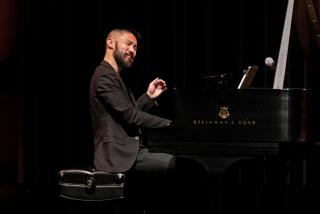SHEYNKMAN DEFENDS THE ‘PURE’ BALALAIKA
- Share via
Seven years ago, Emanuil Sheynkman left the Soviet Union to escape the manifestations of anti-Semitism and to pursue his chosen profession in the West.
Arriving in Rome with his wife, he calmly told his job placement interviewer that he was a balalaika player. As Sheynkman recalled, she flipped worriedly through her listings and told him: “I can’t find it here. Do you have any hobbies?”
Chess, he replied--but not good enough to earn a living. “What did your father do?” Bookkeeping. “Oh good,” she responded brightly. “You can be a bookkeeper.”
Welcome to Freedom.
“We were very depressed,” Sheynkman said. “Even after we arrived in America soon after, people told me: ‘Sell insurance. Be a car dealer.’ But I was determined to earn my living as a musician. And I’ve done OK.”
In establishing a reputation in the United States, Sheynkman, 46, has been aided by an obvious lack of competition here. But a good deal of his success, no doubt, resulted from his consummate skills on both the three-string balalaika and the eight-string mandolin, as the audience may well discover at his recital tonight8 in the Fine Arts Village Theatre, UC Irvine.
Pointing to the lack of competition, Sheynkman (who speaks clear, if still-accented, English) said he knew of only one other Russian-emigre professional balalaika player in this country.
“Back home, players are scared to leave. They’re all worried that they can’t make a living here.” An unfortunate situation because of the misconceptions most Americans have of this funny-looking triangular box with a neck.
“The instrument has gotten a dirty image,” he said, “mainly from all the Gypsy cabaret music that has been heard so much. In Russia, Gypsy music never touched the balalaika.”
Another bad influence, he added, has been Hollywood. “I’ve played on some sound tracks, and it’s criminal what they (movie composers) have done. They don’t know anything about writing for it. ‘Dr. Zhivago’ is typical. The way they use that phony tremolo.”
The music he will play at the 8 p.m. concert at UCI----accompanied by his pianist wife, Ksenia Sudarikova--is “pure balalaika,” Sheynkman said.
What is pure balalaika?
In ensemble, he said, the now-disbanded Odessa Balalaikas came fairly close. (He maintained a tight association with the group, whose bass player, David Lieberman, is now Sheynkman’s manager.)
Proper solo repertory, he continued, is best exemplified by tonight’s program: works by Vasily Andreev (“the father of the modern balalaika”), some arrangements of Russian folk songs, a set of his own compositions and a collection of transcriptions that includes a rag by Scott Joplin.
Wait a minute. Joplin? “Pure balalaika”?
“My mission,” Sheynkman said, “is to show the possibilities on the instrument. They are unlimited. I can play everything from Bach to Offenbach.”
The mandolin portion of tonight’s recital encompasses what Sheynkman describes as “turn-of-the-century salon music for violin or mandolin” by such unknowns as Ambrosio, Mezzakapo, Braga and Bazzini.
Not a Russian among them. “The Russians prefer to promote their own instruments,” Sheynkman said. “The mandolin is not too successful there, though a composer named Igor Rogalev wrote a concerto for me.”
Sheynkman himself has had a hand in expanding the repertory for the balalaika. He has plans to record his string quintet--scored for balalaika and string quartet--with the Kronos Quartet if all goes according to plan.
Is this flurry of activity all part of a master plan? “I would like to be part of a rebirth of interest in the balalaika,” he said.
More to Read
Sign up for Essential California
The most important California stories and recommendations in your inbox every morning.
You may occasionally receive promotional content from the Los Angeles Times.













